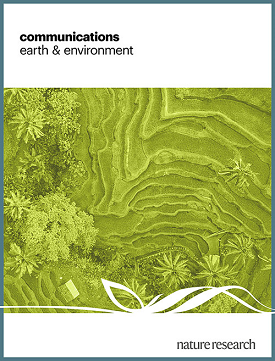Widespread outdoor exposure to uncompensable heat stress with warming
IF 8.9
1区 地球科学
Q1 ENVIRONMENTAL SCIENCES
引用次数: 0
Abstract
Previous studies projected an increasing risk of uncompensable heat stress indoors in a warming climate. However, little is known about the timing and extent of this risk for those engaged in essential outdoor activities, such as water collection and farming. Here, we employ a physically-based human energy balance model, which considers radiative, wind, and key physiological effects, to project global risk of uncompensable heat stress outdoors using bias-corrected climate model outputs. Focusing on farmers (approximately 850 million people), our model shows that an ensemble median 2.8% (15%) would be subject to several days of uncompensable heat stress yearly at 2 (4) °C of warming relative to preindustrial. Focusing on people who must walk outside to access drinking water (approximately 700 million people), 3.4% (23%) would be impacted at 2 (4) °C of warming. Outdoor work would need to be completed at night or in the early morning during these events. Farmers and people collecting drinking water outside are projected to be at risk of not achieving sufficient heat dissipation to maintain a stable body temperature at 2 degrees Celsius of global warming, according to an analysis based on a physically based model and heat stress scenarios.

广泛的户外暴露于不可补偿的热应激与变暖
先前的研究预测,在气候变暖的情况下,室内出现不可补偿的热应激的风险会增加。然而,对于那些从事基本户外活动(如取水和耕作)的人来说,这种风险的时间和程度知之甚少。在这里,我们采用了一个基于物理的人体能量平衡模型,该模型考虑了辐射、风和关键的生理效应,利用偏差校正的气候模型输出来预测室外不可补偿热应激的全球风险。以农民(约8.5亿人)为研究对象,我们的模型显示,在相对于工业化前的2(4)°C升温情况下,每年2.8%(15%)的总体中位数将遭受数天不可补偿的热应激。以必须外出获取饮用水的人(约7亿人)为重点,如果升温2(4)摄氏度,3.4%(23%)的人将受到影响。在这些活动期间,户外工作需要在夜间或清晨完成。根据一项基于物理模型和热应激情景的分析,在全球变暖2摄氏度的情况下,农民和在室外取水的人预计将面临散热不足的风险,无法维持稳定的体温。
本文章由计算机程序翻译,如有差异,请以英文原文为准。
求助全文
约1分钟内获得全文
求助全文
来源期刊

Communications Earth & Environment
Earth and Planetary Sciences-General Earth and Planetary Sciences
CiteScore
8.60
自引率
2.50%
发文量
269
审稿时长
26 weeks
期刊介绍:
Communications Earth & Environment is an open access journal from Nature Portfolio publishing high-quality research, reviews and commentary in all areas of the Earth, environmental and planetary sciences. Research papers published by the journal represent significant advances that bring new insight to a specialized area in Earth science, planetary science or environmental science.
Communications Earth & Environment has a 2-year impact factor of 7.9 (2022 Journal Citation Reports®). Articles published in the journal in 2022 were downloaded 1,412,858 times. Median time from submission to the first editorial decision is 8 days.
 求助内容:
求助内容: 应助结果提醒方式:
应助结果提醒方式:


